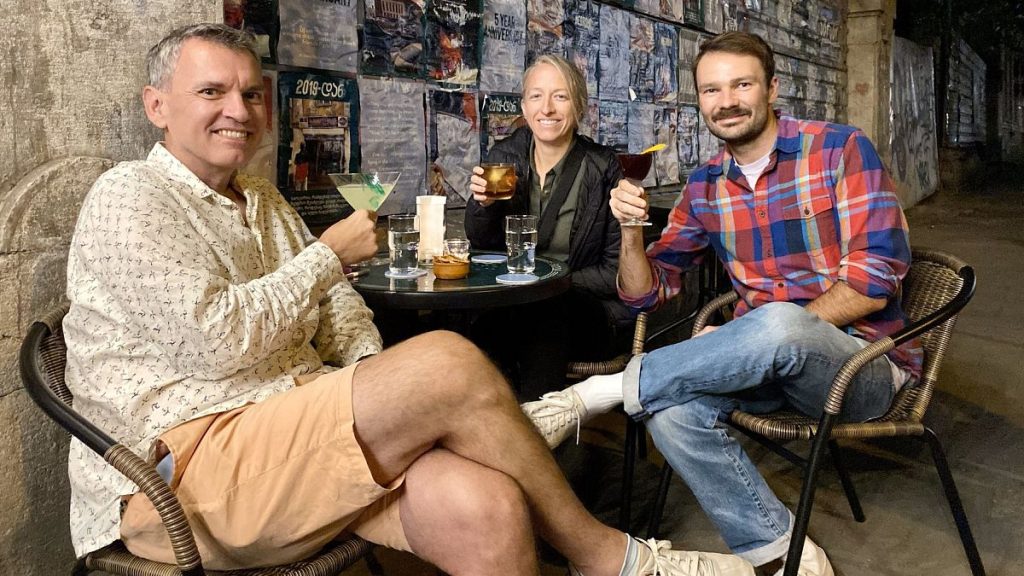Summarize this content to 2000 words in 6 paragraphs
Can Tbilisi stay a haven for digital nomads amid rising costs and political tensions?
Before I could even place it on a map, I had heard glowing reports of life in Tbilisi.I heard that the Georgian capital was affordable. The food was incredible and hospitality even more so. Best of all, most nationalities did not need a visa to enter the country – and they could stay for up to a year at a time, with no limit to the number of re-entries.What more could a digital nomad need? Well, besides affordable WiFi and workspaces.Earlier this year, my wife and I uprooted our lives in Bangkok, where we had lived for much of the past 13 years, and moved to Tbilisi. I quickly discovered that it was unlike any other digital nomad destination I had ever visited.While cities across Europe and Asia were seeking to stem the flow of digital nomads, Tbilisi has seemed to embrace them. Why do so many destinations turn against digital nomads?The traits that make digital nomad hotspots so attractive often end up being their undoing. Just look at Lisbon.The promise of year-round sun, cheap and delicious food and low rent lured as many as 16,000 relatively high-earning digital nomads to the Portuguese capital.But when the cost of living rose and locals got priced out of their city,backlash against the liberal policies that attracted remote workers to Lisbon grew.This summer, Barcelona famously bristled against its huge numbers of tourists and digital nomads. Cafés in Paris and Berlin havebegun to ban laptops.For the most part, Tbilisi has not suffered the same fate as these European cities. In rankings of the world’s top spots for digital nomads, Tbilisi continues to appear in the top 15 – if not the top ten. One of the reasons might be its make-up.Tbilisi: A young city full of bars, restaurants and co-working spacesIt doesn’t take long to realise that Tbilisi is a young city, even if it has a history that stretches back to the fifth century.In any neighbourhood I look at, from the cobblestoned streets of Sololaki to rapidly developing Vera, cafés, restaurants and wine bars have filled out the old houses and hidden gardens.Remote workers regularly prop up cafés along the central avenue, Rustaveli. Others tap away at community hubs such as the Stamba Hotel, Fabrika and Orbeliani Bazaar.Weekly group meet-ups range from trips to the wine-growing region to nights out at the theatre and sunset hikes to Mtatsminda, a hilltop park overlooking the city.And the nightlife is a level beyond lively – Tbilisi’s eclectic clubs and carefree, party-through-dawn ethos have earned it comparisons to Berlin. This youthful energy goes both ways. Digital nomads fall for Tbilisi’s charms, while Georgians seem to value their growing exposure to international communities. In fact, 80 per cent of the population now sees the country’s future aspart of Europe.Georgia’s secret selling point is its welcoming cultureIf the infrastructure and communities don’t set Tbilisi apart, the hospitality does.In Georgia, there’s an adage that every guest is a divine gift. This powerful ideology plays out even in everyday interactions and makes integrating easy for those who try.I’ve been feted with wine and food by people I’ve only just met. After attending just one event organised by the Tbilisi Running Club – a diverse group of locals, expats, travellers and digital nomads representing dozens of countries – I began to receive almost daily messages from some of the Georgian members, my newly made friends.There’s another reason that such a society might favour laptop-toting outsiders.The average salary in Georgia has hovered around €500 per month for years. As demand for property has increased, many have moved back into family homes and rented out their apartments (often at higher prices) to generate additional income.But with rent for a one-bedroom apartment still averaging about €500 per month, Tbilisi remains an affordable place to set up for months at a time or more. Existential threats and rising costs: Tbilisi is not all wine and rosesBefore I moved to Tbilisi, several friends voiced concerns about regional security. At a bar in Bangkok, one friend opened Google maps, pointed at Georgia’s jagged border with Russia and asked – jokingly, I think – if I was mad.They were perhaps right to be concerned about security.When Russia invaded Ukraine in 2022, tens of thousands of Russians fled to Tbilisi, sending apartment prices skyrocketing. Two friends of mine saw their rent jump from €250 per month in 2021 to more than €700 today.The arrival of so many Russians may have also rattled Georgia’s welcoming spirit.Anti-Russia rhetoric is everywhere. Some locals and expats refuse to visit Russian-owned businesses, taking offense to the parallel community forming in the city.Could democratic back-sliding be Tbilisi’s downfall among digital nomads?In 2008, Russia invaded Georgia in support of the breakaway regions of Abkhazia and South Ossetia and stripped it of 20 per cent of its land. Even now, the ruling party, Georgia Dream, is pivoting away from Europe and re-entering Russia’s orbit.That has not sat well in a country where many share a contempt for their northern neighbour.When Georgia Dream announced in November, following acontested election, that it would pause efforts to join the European Union, tensions boiled over. Even as I’m writing this story, Georgians are rallying by the thousands on the streets of Tbilisi.These pressures don’t exist in other digital nomad destinations. With so much uncertainty, it’s easy to picture the country’s liberal visa policies changing and Tbilisi’s star fading. And yet the qualities that make it so attractive aren’t going away, either. Georgians are among the most hospitable people I’ve ever met. When the dust settles, their welcoming character should continue to make Tbilisi a great place for digital nomads. Especially for those who want to be part of a truly vibrant community.
Keep Reading
Subscribe to Updates
Get the latest creative news from FooBar about art, design and business.
© 2026 Globe Timeline. All Rights Reserved.









